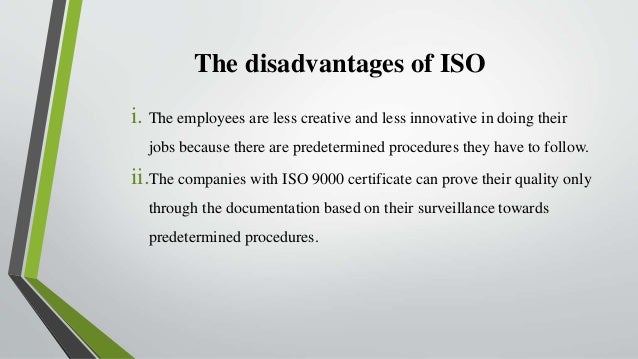
Disadvantages Of Implementing Iso 9001
Photo by: contact ISO 9000 is a set of international standards of quality management that have become increasingly popular for large and small companies alike. 'ISO is grounded on the 'conformance to specification' definition of quality, ' wrote Francis Buttle in the International Journal of Quality and Reliability Management. 'The standards specify how management operations shall be conducted. ISO 9000's purpose is to ensure that suppliers design, create, and deliver products and services which meet predetermined standards; in other words, its goal is to prevent non-conformity.'
ISO 9000 certification and its’ effects on overall financial performance of the certified firm. The focus is on Greek companies. The findings are based on the latest version of the ISO series (2000), which is generally accepted as it has diminished most of the disadvantages of the previous (1994) version.
Used by both manufacturing and service firms, ISO 9000 had been adopted by more than 100 nations as their national quality management/quality assurance standard by the end of 1997. This quality standard was first introduced in 1987 by the International Organization for Standards (ISO) in hopes of establishing an international definition of the essential characteristics and language of a quality system for all businesses, irrespective of industry or geographic location. Initially, it was used almost exclusively by large companies, but by the mid-1990s, increasing numbers of small-and mid-sized companies had embraced ISO 9000 as well. In fact, small and moderate-sized companies account for much of the growth in ISO 9000 registration over the past several years. Kaznj russkih soldat v chechne vikipediya de la. The total number of ISO 9000 registrations in the United States increased from a little more than 2, 200 in 1993 to more than 17, 000 in 1998; of those 17, 000 registrations, nearly 60 percent were held by companies with annual sales of $100 million or less.
The increased involvement of small and midsized firms in seeking ISO 9000 registration is generally attributed to several factors. Many small businesses have decided to seek ISO 9000 certification because of their corporate customers, who began to insist on it as a method of ensuring that their suppliers were paying adequate attention to quality. Other small business owners, meanwhile, have pursued ISO 9000 certification in order to increase their chances of securing new business or simply as a means of improving the quality of their processes. 'The pressure for companies to become ISO 9000-certified is absolutely increasing and will continue to increase, ' predicted one management consultant in an interview with Nation's Business. 'The question many smaller companies have to ask is when, not if, they [will] get ISO 9000-registered.' FURTHER READING: Buttle, Francis. 'ISO 9000: Marketing Motivations and Benefits.'
International Journal of Quality and Reliability Management. Johnson, P.L. ISO 9000: Meeting the New International Standards. McGraw-Hill, 1993. 'An Innovative Approach to Make ISO 9000 Standards More Effective.' Total Quality Management.
February 1998. Karapetrovic, Stanislav, Divakar Rajamani, and Walter Willborn. 'ISO 9000 for Small Business: Do It Yourself.' Industrial Management. May-June 1997. Meyer, Harvey R.
– “Set to Chosen Gateway” of Warcraft III: It modifies both the Chosen Close Server Gateway and the Open Server address. Bnet gateway editor dota 3. – “IP” of Gateway: both IP and Domain name are allowed.
'Small Firms Flock to Quality System.' Nation's Business. The ISO 9000 Book: A Global Competitor's Guide to Compliance and Registration.
Quality Resources, 1993. Rayner, P., and L.J. 'BS 5750/ISO 9000: The Experience of Small and Medium-Sized Firms.' International Journal of Quality and Reliability Management. Simmons, Bret L., and Margaret A. 'The Relationship between ISO 9000 and Business Performance: Does Registration Really Matter?'